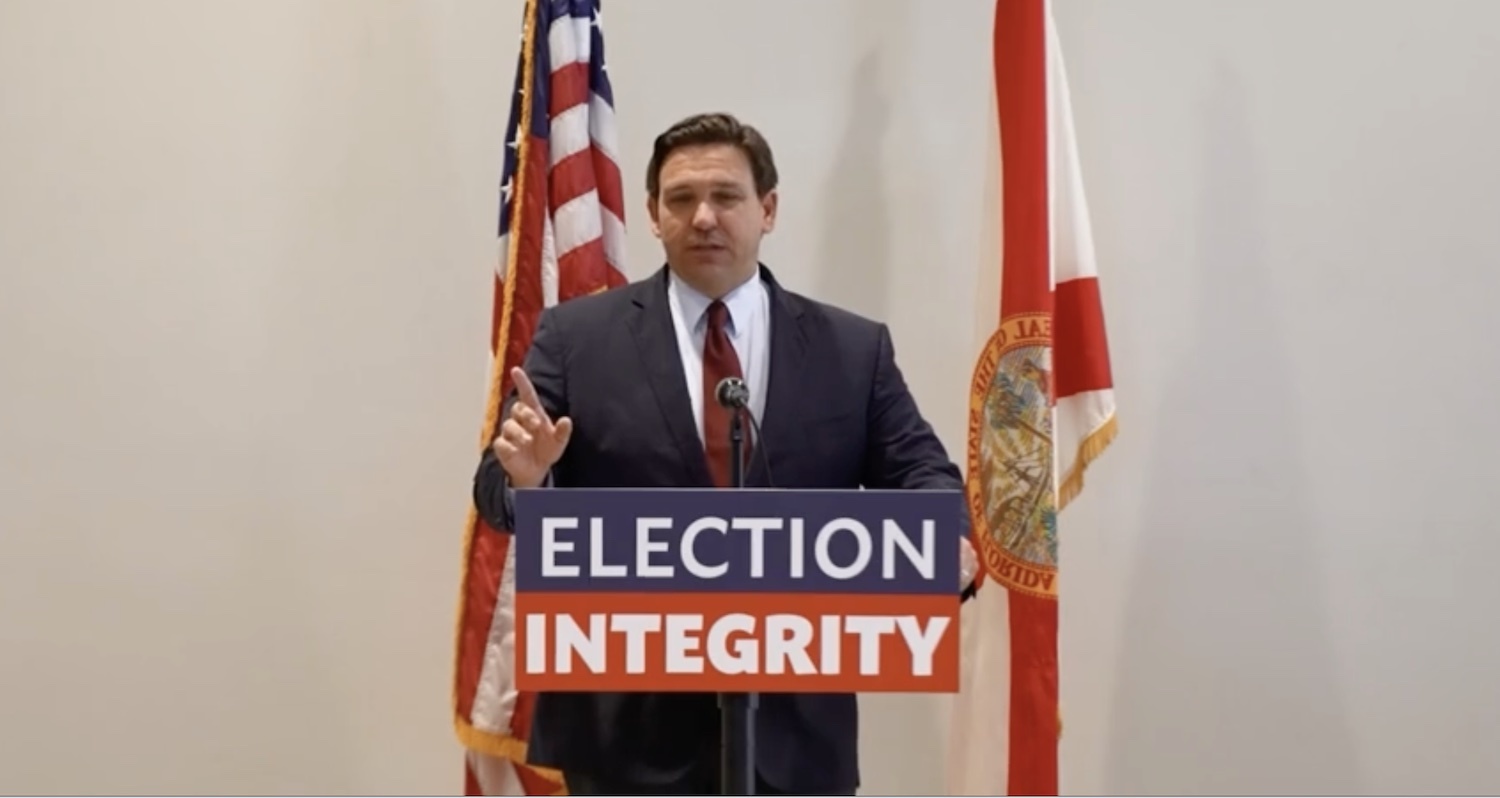INSTITUTE INDEX: Why felony disenfranchisement is a public safety problem

After the voters of his state overwhelmingly approved a constitutional amendment restoring voting rights to most people with felony convictions who complete their prison sentences, Florida Gov. Ron DeSantis (R) signed into law a measure requiring them to pay off any fines, fees, or restitution first. DeSantis says the policy promotes respect for the law, but a growing body of evidence shows that making it harder for people with felony convictions to vote again drives up recidivism rates. (Still from official video.)
Estimated number of Americans who were barred from voting last year because of state laws disenfranchising people with felony convictions: 4.6 million
Percent of the total U.S. voting-age population that number represents: 2
Number of states — all of them in the South — where at least 8% of the voting-age population is disenfranchised by such laws: 3*
Factor by which Black Americans are more likely than other Americans to be disenfranchised due to a felony conviction: 3
Percent of felony-disenfranchised Americans who are living in the community, as opposed to a prison or jail: 76
Percent by which the number of Americans disenfranchised because of felony convictions has declined since 2016, as some states have adopted reforms: 24
Month in which 65% of voters in Florida — the state that disenfranchises the most people for felony convictions — approved a constitutional amendment to automatically restore voting rights after sentence completion, except in cases of murder and sex crimes: 11/2018
Months later that Florida Gov. Ron DeSantis (R) signed into law a bill passed by the Republican-controlled legislature requiring people with felony convictions who've completed their sentences to pay off any restitution and outstanding fines and fees before regaining their voting rights — a law challenged in court as a poll tax but ultimately upheld: 7
Month in which DeSantis announced he was establishing an election police force, which has arrested at least 20 people on felony charges for improper voting, with all of the cases related to defendants' confusion over their eligibility: 11/2021
Number of Floridians who remain disenfranchised today due to felony convictions: nearly 1 million
In a North Carolina case challenging the state's 1973 felony disenfranchisement law as racially discriminatory and rooted in white supremacy, month in which a trial court ruling allowed residents with felony convictions to register to vote as long as they completed their prison sentences, regardless of whether they were on probation or parole or owed money to the court system: 8/2021
Months later that the North Carolina Supreme Court's newly elected Republican majority — in an "exceedingly rare" procedural move — overturned that ruling, meaning that some of the roughly 56,000 residents with felony convictions who were eligible to vote last year will not be able to do so in future elections: 20
When North Carolina passed its felony disenfranchisement law a half-century ago, number of Black members who served in the General Assembly, which Justice Trey Allen's opinion for the all-white majority said deserved the trial court's "presumption of legislative good faith": 3
As noted in a recent brief from The Sentencing Project, year in which a study was published in the Columbia Human Rights Law Review showing that Minnesotans with a criminal history were significantly less likely to be rearrested if they voted in the 1996 presidential election: 2004
Percent less likely that people with felony convictions are to return to prison if they're released in states where their voting rights are automatically restored, as opposed to states where they are permanently disenfranchised, according to a 2012 article published in the Berkeley La Raza Law Journal: 10
In a 2012 study of felony-disenfranchised Floridians by researchers with Tulane University and the University of Florida, percent of respondents who directly connected the ability to vote to the ability to remain law abiding: 39
Year a study was published looking at Virginians with felony convictions during the 2017 gubernatorial election who were eligible to vote or have their voting rights restored, finding that extending voting rights can lead to prosocial attitudes, which aid community reintegration: 2019
* Alabama, Mississippi, and Tennessee.
(Click on figure to go to source. Many of the numbers in this index are from the recent brief released by The Sentencing Project titled "Increasing Public Safety by Restoring Voting Rights.")
Tags
Sue Sturgis
Sue is the former editorial director of Facing South and the Institute for Southern Studies.
